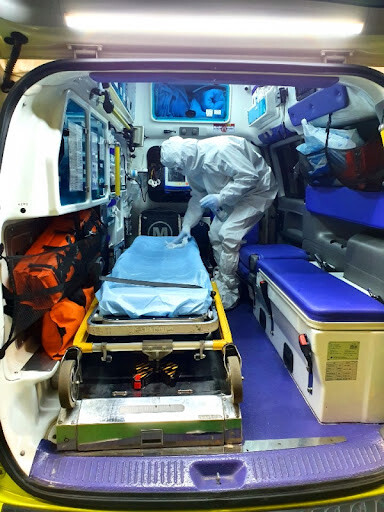
Asan, Chungcheongnam-do, South Korea – In a proactive move to safeguard public health and ensure the highest standards of hygiene within its emergency medical services (EMS), the Chungcheongnam-do Institute of Health and Environment has announced a comprehensive investigation into the levels of pathogenic bacteria contamination in all 137 of the province’s 119 ambulances. The meticulous survey, conducted in close collaboration with the Chungcheongnam-do Fire Headquarters, aims to identify potential risks of secondary infections and prevent the further spread of infectious agents within the critical environment of emergency patient transport.
The investigation, which commenced recently and is slated for completion by June 2025, will involve the systematic sampling and rigorous testing of designated high-touch surfaces within each of the 137 ambulances operating across the province. Recognizing the potential for microbial transmission in the confined spaces of emergency vehicles, the research team will meticulously collect specimens from five key locations within each ambulance. These critical areas include the driver's seat steering wheel in the operational compartment, the surface of the medicine cabinet within the patient care area, the mattress of the primary stretcher, the attendant seating, and the stethoscopes utilized by paramedics – essential tools that come into direct contact with patients.
In total, a substantial 685 samples will be meticulously collected and subjected to advanced microbiological analysis. The Chungcheongnam-do Institute of Health and Environment will employ a dual testing approach, utilizing both traditional bacterial culture techniques and state-of-the-art real-time polymerase chain reaction (RT-PCR) assays. Bacterial culture will allow for the isolation and identification of a broad spectrum of microbial contaminants, while the highly sensitive RT-PCR method will specifically target and quantify the presence of four key pathogenic bacteria of significant public health concern.
The panel of target pathogens for this crucial investigation includes:
Staphylococcus aureus: A common bacterium known to cause a wide range of infections, from minor skin ailments and respiratory tract infections to severe food poisoning and, in some cases, life-threatening bloodstream infections. Its ability to develop antibiotic resistance makes its presence in healthcare settings particularly concerning.
Bacillus cereus: Primarily recognized as a causative agent of foodborne illnesses, Bacillus cereus can produce toxins leading to diarrheal or emetic syndromes. Its resilient spore-forming nature allows it to persist in various environments, posing a potential contamination risk.
Klebsiella pneumoniae: An opportunistic pathogen frequently implicated in nosocomial infections, Klebsiella pneumoniae can cause serious respiratory tract infections such as bronchitis and pneumonia, particularly in individuals with compromised immune systems. Certain strains exhibit significant antibiotic resistance, complicating treatment.
Vancomycin-Resistant Enterococci (VRE): A notorious group of antibiotic-resistant bacteria, VRE poses a significant threat to vulnerable patient populations, especially those with weakened immune systems or undergoing invasive medical procedures. Infections caused by VRE, such as urinary tract infections and sepsis, are often difficult to treat and associated with increased morbidity and mortality.
Jeong Geum-hee, the esteemed Director of the Chungcheongnam-do Institute of Health and Environment, underscored the paramount importance of this initiative, stating, "This comprehensive survey is a critical step towards ensuring the utmost safety and hygiene of our 119 ambulances, which serve as the frontline of emergency medical care in our province. By meticulously assessing the levels of pathogenic bacteria contamination, we aim to proactively identify potential risks and implement effective strategies to prevent secondary infections among patients and protect our dedicated paramedics. This endeavor will significantly contribute to bolstering public trust in our emergency medical services and mitigating the potential for the widespread transmission of infectious diseases."
The findings of this extensive investigation will provide invaluable data on the microbial landscape within Chungcheongnam-do’s ambulance fleet. This evidence-based approach will enable the provincial health authorities and the fire department to implement targeted and effective disinfection protocols, optimize cleaning procedures, and potentially identify specific materials or design elements within the ambulances that may be more prone to microbial contamination. Furthermore, the results will inform the development of enhanced training programs for EMS personnel, emphasizing the critical importance of stringent hygiene practices and infection control measures in the pre-hospital setting.
This proactive initiative by Chungcheongnam-do reflects a growing recognition of the potential for healthcare-associated infections (HAIs) to occur not only within hospital environments but also in pre-hospital settings such as ambulances. Research has increasingly highlighted the risk of microbial contamination in emergency vehicles and the potential for transmission to both patients and healthcare workers. Factors such as the confined space, the urgency of emergency situations, and the diverse patient population transported in ambulances can contribute to the accumulation and spread of microorganisms.
By undertaking this thorough investigation, Chungcheongnam-do is demonstrating a commitment to evidence-based public health practices and a dedication to providing the safest possible emergency medical care to its citizens. The results of this study are anticipated to not only benefit the residents of Chungcheongnam-do but also serve as a valuable model for other provinces and regions seeking to enhance the safety and hygiene standards of their emergency medical services. The proactive measures taken by the Chungcheongnam-do Institute of Health and Environment and the Fire Headquarters underscore the critical importance of a multi-faceted approach to infection prevention and control, extending beyond the walls of hospitals to encompass all aspects of healthcare delivery.
[Copyright (c) Global Economic Times. All Rights Reserved.]



























